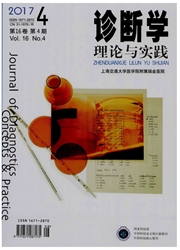

 中文摘要:
中文摘要:
目的:研究机械牵张对离体豚鼠左心耳心肌细胞动作电位(AP)的影响,观察几类抗心律失常药物对机械牵张引起的心房心肌细胞AP改变的作用。方法:采用常规做电极技术记录心肌细胞AP,观察机械牵张对其的影响,并分析抗心律失常药物对机械牵张引起的心房心肌细胞AP和有效不应期(ERP)变化的作用。结果:①机械牵张可加快心房心肌细胞整个复极过程,牵张效果呈心肌牵张长度依赖性,但牵张刺激对静息膜电位(RMP)和动作电位幅度(APA)无影响;②进一步分析抗心律失常药物对机械牵张后的心房心肌细胞RMP、APA、动作电位时间(APD)和ERP的影响后发现,Ⅰa类抗心律失常药物奎尼丁可使该AP复极至90%所需的时间(APD50)和ERP均显著延长(P均〈0.01),APA显著降低(P均〈0.01);Ⅰb类抗心律失常药物利多母因可使该AP复极至50%所需的时间(APD50)、APD50和ERP显著缩短(P均〈0.01);Ⅰc类抗心律失常药物氟卡尼可使该APA、AP复极至20%,所需时间(APD20)和APD50进一步缩短,但未发现Ⅱ类抗心律失常药物普萘洛尔有改变机械牵张后的RMP、APD和ERP作用(P〉0.05);Ⅲ类抗心律失常药物胺碘酮可使机械牵张后的APD20、APD50、APD90和ERP显著延长(P均〈0.01);Ⅳ类抗心律失常药物维拉帕米可使该APD50和APD90显著延长(P均〈0.01)。结论:①Ⅰa、Ⅲ和Ⅳ类抗心律失常药物可防止机械牵张引起的心房心肌细胞APD和ERP缩短;②Ⅰb和Ⅰc类抗心律失常药物可促进机械牵张引起的心房心肌细胞APD和ERP的缩短;③Ⅱ类抗心律失常药物对牵张引起的心房心肌细胞APD和ERP改变无影响。
 英文摘要:
英文摘要:
Objective To study the influence of mechanical stretching on the action potential (AP) of atrial cardiomyocyte and observe the effect of antiarrhythmic drugs on the alteration of action potential of atrial cardiomyocyte induced by the mechanical stretching. Methods Conventional microelectrode technique was used to record the action potential (AP) of cardiomyoeyte, observing the influence of mechanical stretching on this action potential and analyzing the effect of antiarrhythmic drugs on the alteration of action potential and effective refractory period (ERP) of atrial cardiomyocyte induced by mechanical stretching. Results (1) Mechanical stretching accelerated repolarization of atrial cardiomyocyte in a stretching length dependant manner, and stretching had no obvious effect on resting membranee potential (RMP) and action potential amplitude (APA). (2) Quinidine, a class Ia antiarrhythmic drug, prolonged the time needed for repolarization of AP to 90% [APD (action potential duration)50], prolonged ERP (P〈0.01) and decreased APA (p〈0.01); lidocaine, a class Ib antiarrhythnlic drug, shortened APD50, APD90 and ERP (P〈0.01); flecainide, a class Ic antiarrhythmic drug, shortened APD20, APD50) and APA (P〈0.01); propranolol, a class Ⅱ antiarrhythmic drug, has no effect on APD and ERP (P〉0.05); amiodarone, a class Ⅲ antiarrhythmic drug, prolonged APD20, APD50 APD90 and ERP (P〈0.01); Verapamil, a class Ⅳ antiarrhythmic drug, prolonged APD50,APD90 and ERP (P〈0.01). Conclusions Class Ia, Ⅲ and IVantiarrhythmic drugs could prevent the shortening of APD and ERP induced by mechanical stretching, whereas class Ib and Ic antiarrhythmic drugs could further promote their shortening. Class Ⅱ antiarrhythmic drugs has no effect on AP and ERP changes induced by mechanical stretching.
 同期刊论文项目
同期刊论文项目
 同项目期刊论文
同项目期刊论文
 期刊信息
期刊信息
